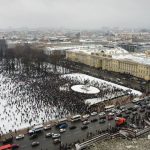
Russia Monitor is a review of the most important events related to Russian internal and external security, as well as its foreign policies.
Date: 25 January 2021
Nord Stream 2 Pipeline Sees Last-Minute Sanctions
Back on January 15, it seemed that Russia could complete its Nord Stream natural gas pipeline. A German federal agency gave its go-ahead for wrapping up the project, while the country’s foreign minister Heiko Maas said Berlin could make a deal with the new U.S. administration. Nonetheless, the outgoing administration had passed a new set of sanctions targeting the project already at risk amid the arrest of Kremlin critic Alexey Navalny.

Russian-owned pipelay barge Fortuna on Sunday (January 24) started construction in the Danish exclusive economic zone to build the missing chunk of the gas link. There are also some other auxiliary vessels anchored off the Danish island of Bornholm. Denmark granted an operations permit for the pipeline yet the outgoing Donald Trump administration had imposed sanction measures on Russian-flagged vessels just a few days before. Thus either Moscow thinks to ignore them or this is yet another demonstrative move, as even Gazprom officially says that the gas pipeline may never be completed. But it is worth looking at what happened throughout the week. First, Antony Blinken, Biden’s nominee to be secretary of state, told his Senate confirmation hearing that he agreed with the U.S. Congress on the Nord Stream 2 pipeline being a harmful project. He added that the newly sworn U.S. administration would have it use every persuasive tool that it has to convince Germany not to move forward with the pipeline. Although Germany’s Federal Maritime and Hydrographic Agency (BSH) on January 15 said construction of the Nord Stream 2 pipeline can restart immediately, two environmental groups took legal action to halt the notice. The situation got so serious that Gazprom has even acknowledged in a Eurobond prospectus there are risks that the Nord Stream 2 gas pipeline project may be suspended or scrapped amid political pressure. Later that same day, on January 19, Vladimir Putin held talks with the CEO of Gazprom Alexey Miller, with Nord Stream also being high on their meeting agenda, though no details are available to the public. Moscow feels “harsh pressure” on the part of Washington, according to Kremlin spokesman Dmitry Peskov who claims it unlawful as more and more restrictions are being added to the list. On January 19, the United States said it imposed sanctions against the pipe-laying vessel, Fortuna, and its owner, a firm called KVT-RUS. Also on that day, the European Parliament held a debate on the detention of Alexey Navalny. Speaking in front of EU lawmakers, EU foreign relations chief Josep Borrell said Nord Stream 2 is a private venture. “Thus, we cannot prevent its construction,” he added. Two days later, members of the European Parliament voted – with 581 votes in favor, 50 against, and 44 abstentions – for a resolution, calling for the immediate halt of Nord Stream 2 in response to the arrest of Russian opposition figure Alexey Navalny. EU lawmakers also said the bloc should not be a friendly place for murky Russian money.
Support Us
If content prepared by Warsaw Institute team is useful for you, please support our actions. Donations from private persons are necessary for the continuation of our mission.
_________________________________
All texts published by the Warsaw Institute Foundation may be disseminated on the condition that their origin is credited. Images may not be used without permission.

















